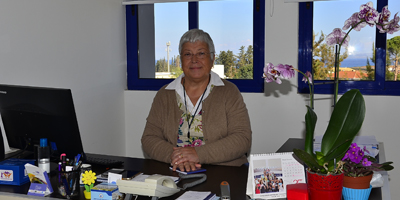EUL Academician Ataman underlined that Negative attitudes towards disabled individuals began to turn positive
Head of European University of Lefke (EUL) Dr. Fazıl Küçük Faculty of Education Department of Special Education Prof. Dr. Ayşegül Ataman made some statements on the occasion “Disabled Week” and conveyed detailed information.
Ataman said that “Disabled Week is a special week celebrated on the same dates in 156 countries that are members of the United Nations. During the Disabled Week; The issue of disability, disability prevention and education of the disabled are emphasized. Related programs are broadcast on radio and television” and added that there is a disability issue in schools that is every day, but these events were not held this year due to the Covid-19 pandemic.
Ataman: The purpose of the Salamanca Statement is the education approach that covers everyone
Ataman said that “The main purpose of its transformation into an event celebrated with ceremonies all over the world during this week is to overcome the restrictions created by the barriers imposed by the society to individuals affected by disability and to develop positive attitudes towards these individuals” and went on to say that these efforts first gain meaning with the community movements that started in the USA, and on June 10, 1994 in Europe, in Salamanca, Spain, more than 300 people representing 92 states and 25 international organizations came together to form the Salamanca Statement.
Ataman emphasized that the aim of the statement was to achieve the “education for all” objective by strengthening the school to serve all children, especially those requiring special education, by developing the “inclusive education” (education that covers everyone) approach.
Ataman listed education for everyone as follows;
* Every child has the right to education.
* Each child has unique characteristics, interests, abilities and learning needs.
* Those who need special education should be able to attend regular schools and these schools should raise their children in a “centred” education system that can meet their needs.
* Unless there are other compelling reasons, all of their children should be enrolled in regular schools, and adopt the inclusive education principle as a legal and political issue.
* Experience and knowledge should be exchanged and projects should be developed with countries with experience in inclusive schools.
Inclusive education includes spending more effort on early diagnosis and intervention as well as professional aspects and wishes in many subjects.
Ataman said that “After the Salamanca Statement, the United Nations Disability Rights Agreement was adopted on December 13, 2006, by implementing an application to cover all rights of individuals affected by the UN and Convention was opened for signature on March 30, 2007 and entered into force in Turkey on 28 October 2009” and underlined that this agreement approaches the rights of individuals with disabilities in a holistic way.
Ataman explained the 24th article of the agreements as;
* States Parties recognize the right of persons with disabilities to education. States Parties should ensure that the integrative education system encompasses people with disabilities at all levels and provides lifelong learning, in order to ensure this right on the basis of equal opportunity and without discrimination. For this, the following goals should be observed.
(a) full development of human potential, dignity and sense of value and strengthening respect for human rights, fundamental freedoms and human diversity
(b) To ensure the development of the personalities, abilities, creativity, mental and physical abilities of the disabled in the highest degree of their potential.
(c) Enabling disabled people to participate effectively in a free society.
2nd article. States Parties must ensure the following to ensure the realization of this right
(a) Disabled people should not be excluded from the general education system due to their disability and children with disabilities should not be excluded from free and compulsory primary and secondary education opportunities due to their disability.
(b) Persons with disabilities should have access to primary and secondary education that is integrative, quality and free of charge, equally with other individuals.
(c) Reasonable arrangements should be made according to the needs of individuals.
(d) In order for the disabled people to benefit from general education effectively, they should get the support they need in the general education system.
(e) Providing individualized effective supportive measures for disabled people in environments that increase academic and social development in accordance with the full participation / integration target of the disabled.
Ataman went on to say that along with the negativities, it is pleasing that the negative attitudes we have created towards disabled individuals who have been ossified in society for years have begun to turn positive and added that these children with special needs in the Republic of Turkey and the TRNC are now trained together without being apart from peers.

